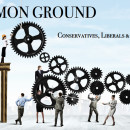What happens when we look past our differences to what unites us? Sometimes nothing happens, sometimes a great deal happens. Sometimes it is work that gets done. Problems get solved.
The author of this issue’s cover story says, “Many good people want to believe in a framework, a set of abiding and directing values that make sense to them. But these frameworks and opinions can end up harming more than helping, as they become so “governing” they prevent a person from testing [their belief systems] in real debate and alliances. The next step is knee-jerk prejudgment and ostracism of others who wear different political labels. No meetings over lunch. No reading of each other’s [stuff]. Just speak the slogans to the convinced.”
Throughout the creation of this Reader Magazine I have kept on my desktop two deeply disturbing and heart-breaking photographs. I have gone back to them over and over again. Studied them. If you have studied World War II, you may have seen one or both of these images. The one image is a contrast of darkness and light: a beautiful Summer day and terrifying, slightly blurry, hurried action, a soldier on a field, firing a rifle at point blank range at a young mother holding a very young child. Visible in the image is a family which is frantically digging their own graves. I have kept this image on my desktop during the writing of this issue to remind me of the seriousness of politics. It is politics, that which creates how a society is structured, how its rules come to be and what those rules are, that had a hand in what transpired on that field that day and why that mother and child were killed. And what happened that day happened literally millions of times to others within a single decade.
Given what is riding on politics, what is riding on how our society is structured, that it affects the rules of our society, we all need to gain a better understanding of it and with relish, strive to get it right. Perhaps it is the loss of remembrance of what politics truly endeavors to do which is part of the problem. I would like to think that most of us would do everything in our power to be the one— if we could— to save that mother and child that day. If we had the power to save them would we? The image is a frozen instant which mirrors what we know has happened in other scenarios, at other times. And at times, the degree of things going wrong has been mind-numbing.
So perhaps the question really comes down to what will we do now with the freedom we have, and the advantages we have? Will we hope that things never get that way? Will we take it upon ourselves to mix with people with different ideologies from us— different value systems— so that we are never those people who think that the best solution with respect to our enemies is their elimination? Can we do more than that? And if so, what is it? What does it take to lift ourselves to a higher plane of consciousness, and what may we gain from it? A better understanding of ourselves? What keeps us from caring? Perhaps it is in someway fitting to remember the mother and child who were lost that day. There was no sense in it, just as there is no sense or rectitude in things that will happen today. And we are here, now. And there is much we can do.


 (909) 335-8100 ·
(909) 335-8100 ·  (909) 335-6777
(909) 335-6777 Email:
Email: